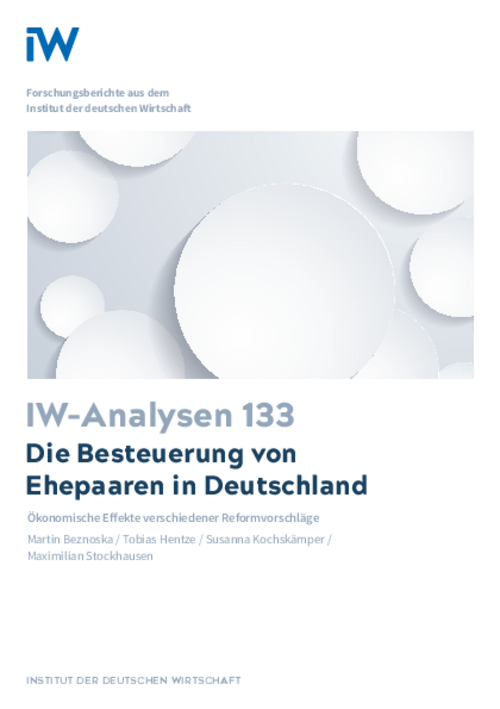How can spouses be taxed both efficiently and fairly? It is not possible to formulate a universally valid solution to this question from a pure tax system point of view, because it depends on the underlying assumptions and norms.

The Taxation of Spouses in Germany: The economic impact of different reform proposals
IW-Analyse

How can spouses be taxed both efficiently and fairly? It is not possible to formulate a universally valid solution to this question from a pure tax system point of view, because it depends on the underlying assumptions and norms.
What is striking in Germany is that fiscal and social legislation contain contradictory provisions. As amended in 2008, the law’s position on alimony suggests that a marriage’s secondary earner can become path dependent if, following the logic of income splitting, they are not, or only marginally, gainfully employed during the marriage. Simulations show the economic impact of different reform models. Limiting the present arrangement, for example, by allowing current spouses only the restricted degree of joint taxation applicable to alimony payments or by introducing individual taxation with a transferable basic tax allowance would limit the splitting effect and therefore particularly penalise marriages where one partner works only part-time or not at all. The work incentives for second earners, and thus especially for women, could only be gradually increased by switching to alternative forms of taxation without accompanying tax relief. For radical improvements, further measures would be necessary, for example relating to the supply of day care centre places and to mini-jobs and free joint-membership of the statutory health insurance system.

Martin Beznoska / Tobias Hentze / Susanna Kochskämper / Maximilian Stockhausen: Die Besteuerung von Ehepaaren in Deutschland – Ökonomische Effekte verschiedener Reformvorschläge
IW-Analyse

More on the topic

Global and European corporate tax reform concepts
The harmonization of corporate taxation at an international level has been on the political agenda for many years. Both the Organization for Economic Cooperation and Development (OECD) and the European Commission have presented reform projects in this regard, ...
IW
The Challenges to the Sustainability of Germany’s Public Finances
The German government’s fiscal responses to the Covid-19 pandemic and the Ukraine war in an attempt to cushion their impact have driven up the country’s general government debt-to-GDP ratio.
IW